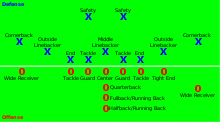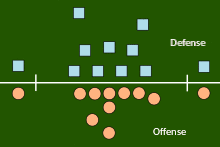An offensive coordinator is a member of the coaching staff of an American football or Canadian football team who is in charge of the team's offense. Generally, along with the defensive coordinator, he represents the second level of command structure after the head coach.

The offensive coordinator is in charge of the team's offensive game plan, and typically calls offensive plays during the game, although some offensive-minded head coaches also handle play-calling.[1] Several position coaches work under the offensive coordinator (position groupings can include quarterbacks, wide receivers, offensive line, running backs, and tight ends).
Unlike most position coaches in football, who are usually on the sidelines during games, offensive coordinators have the option of operating from the press box instead of being on the sideline. There are advantages and disadvantages to both locations.
Since 2009, nearly 40% of head coaches hired in the NFL had been serving as offensive coordinators.[2]
See also
- List of active National Football League offensive coordinators
References
- ^ "Coaching Staff in American Football". dummies. Retrieved 12 April 2020.
- ^ Baker, Kendall. "The failure of the NFL's Rooney Rule". AXIOS. Retrieved 17 April 2020.
